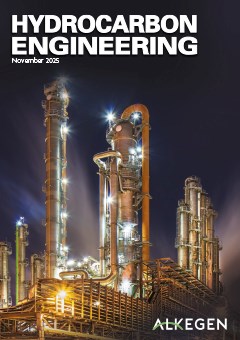November 2025
This November issue of Hydrocarbon Engineering opens with a keynote from Euro Petroleum Consultants (EPC) who consider how innovation among European refiners could lead to the scale-up of green hydrogen, laying the foundations for a sustainable future. Other articles offer detailed, technical consideration on a variety of topics such as catalysts, hydrocracking, process control, water management, distillation units, insulation, safety, and much more.
This month's front cover is brought to you by Alkegen.
Register for free »
Get started now for absolutely FREE, no credit card required.
Contents
Comment
News
Ingenuity and innovation
Miro Cavkov, Euro Petroleum Consultants (EPC), Bulgaria, considers how European refiners could be positioned to unlock the scale-up of green hydrogen, alongside the production of more sustainable downstream products.
Fine margins
Asher Parr-Besemer, Imubit, and Heather Gilligan, H Gilligan Consulting, consider how closed loop AI optimisation technology can provide margin improvements for hydrocracker operations.
Iron resistance
Eswar Iyyamperumal and Deependra Parmar, Ketjen, outline the vital role of iron resistant catalysts amid the growing need for refiners to process lower-quality crude feedstocks.
Bridging lab-scale and industrial applications
Benjamin Mutz, Robert Baumgarten, and Christoph Hauber, hte GmbH, examine methods for the validation of CO2-converting catalysts, to ensure laboratory results transfer to demanding industrial applications.
Improving the accuracy of XRF analysis
Taco van der Maten, Malvern Panalytical, the Netherlands, explores how certified reference materials can improve the accuracy of catalyst X-ray fluorescence analysis.
Unlocking sustainable growth with performant mesoporous zeolites
Dr. Danny Verboekend, Zeopore Technologies, Belgium, explains why performant high-porosity zeolites are ready to unlock sustainable growth in producing high-value products, SAF, and chemical feedstocks.
High performing carbon capture by TAMOF-1
José Ramón Galán-Mascarós, Institut Català d’Investigació Química, alongside Stefano Giancola and Santiago Capelo-Avilés, ORQUESTRA Scientific, and Meritxell Vila-Fontes, MERYT Catalysts & Innovation, explore the potential use of metal-organic frameworks as an alternative to carbon capture technologies amid the growing push for decarbonisation.
Keeping things condensed
Mason Battaglia, Graham Manufacturing, analyses the effects of intercondenser operation on vacuum distillation unit performance.
Polishing performance
Neil Richards, PS Filter, Canada, explores water management solutions that can help improve water efficiency for refinery and petrochemical operations to meet environmental goals.
Protecting critical components
Piping components are subject to extreme thermal, mechanical, and chemical conditions that can accelerate failure mechanisms. Mateus Camparotto, Alkegen, Brazil, explores how insulation solutions can help to protect components and mitigate against issues such as corrosion under insulation, thermal fatigue, creep, and oxidation.
Perfecting pipeline processes
Shrikant Gadage and Eike Schwede, Emerson, consider how advanced flow meters can be best implemented in pipelines at terminals and refineries during product changeover to minimise waste and increase efficiency.
Safety through smarter engineering
Atul Arunkumar Shenoy, Carles Miller, and Patrick Wilhelm, Burns & McDonnell, consider how operators can mitigate and avoid arc flash incidents to ensure personnel and plant safety.
Barriers to blast
Rutesh Patil, Hunter Buildings, USA, considers the importance of blast-resistant doors within petrochemical plants and refinery operations, highlighting best practices and maintenance strategies to ensure safety.
Register for free »
Get started now for absolutely FREE, no credit card required.

